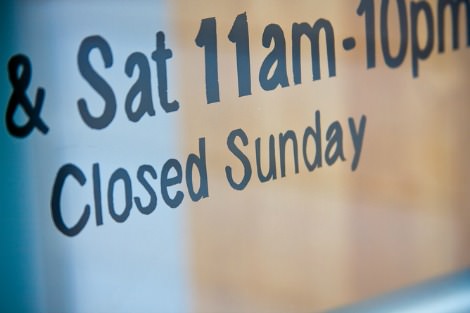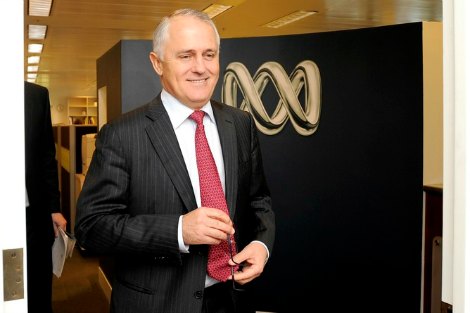Search Results: dividends
-

ECONOMICS
- David James
- 07 March 2017
17 Comments
Witnessing the debate over Sunday penalty rates, an intriguing pattern of thinking emerged. It can be characterised as a microcosm/macrocosm duality. Those arguing for lower Sunday wage rates demonstrate their case by talking about individual businesses, the micro approach: 'Many businesses would love to open on a Sunday and if wage rates were lower, they would. Unleash those businesses and greater employment will follow.' Superficially impressive, this does not survive much scrutiny.
READ MORE 
-

AUSTRALIA
- Fatima Measham
- 16 February 2017
9 Comments
There's not enough jobs because foreigners are stealing them. Wages aren't going up because foreigners drag them down. Graduates aren't finding positions because skilled worker visas are being given out too easily. Such answers are potent in pockets of Australian society that would rather blame outsiders than demand their government create new jobs, lift the minimum wage, improve work conditions and training, and mediate skills transfers from industries that are contracting, such as mining.
READ MORE 
-

ENVIRONMENT
- Frank Brennan
- 28 November 2016
'No matter what the economic, political and legal problems confronted by modern day India, our response can be improved by an application of the key principles and norms developed in the international law of trade and human rights, helping to enunciate the realm of law, regulation and political accountability, enhancing public scrutiny providing the right environment for doing business.' Frank Brennan presents the 25th JRD Tata Oration, Xavier School of Management, Jamshedpur, India, 26 November 2016.
READ MORE
-

AUSTRALIA
- Sonia Nair
- 24 October 2016
15 Comments
Social theorist Pierre Bourdieu posited the disturbing finding that academic underperformance in lower-class students could be traced back to their lack of cultural capital, defined as 'familiarity with the dominant culture in a society, and especially the ability to understand and use 'educated' language''. According to Bourdieu, the mainstream education system assumes a certain level of cultural capital and as a result, educators speak in a manner that is only understood by a privileged few.
READ MORE 
-

ECONOMICS
- David James
- 13 September 2016
18 Comments
The argument that putting government operations into private hands ensures that things will run better and society will benefit is not merely a stretch; it is in many respects patently false. The argument is based on the claim that the market always produces superior price signals. Yet one area where private enterprise definitely fails is long term stability. If there is an expectation that a privatised service should last in the long term, and usually there is, then selling it to business is a bad choice.
READ MORE 
-

AUSTRALIA
- Fatima Measham
- 05 August 2016
Perhaps what will ultimately convince media and entertainment companies that it is in their interest to be sincere about diversity is that there's money in it. A UCLA study found that in 2014, eight films that had diverse casts (out of 163) also had the highest median global revenues and returns on investment. In addition, TV shows with majority non-white casts rated extremely well, even among white households. This challenges conventions around what media consumers find appealing.
READ MORE 
-

RELIGION
- Andrew Hamilton
- 07 April 2016
19 Comments
How do good people sink to this? The answer lies in the mutation of economic ideology from the crude buccaneering spirit of doing whatever it takes to get rich into a more urbane form. People see themselves as competing, not only for their own economic benefit, but for that of the company. This means greed can mask itself as altruism in serving a larger good. And as in the case of churches, identification with the company provides reason for protecting the company's reputation at all costs.
READ MORE 
-

AUSTRALIA
- Frank Brennan
- 23 October 2015
4 Comments
Francis knows there are all sorts of issues inside and outside the Church where for too long people with power have tried to keep the lid on, in the hope that the problems and complexities will go away, often by parodying those who see the problems or complexities as small 'l' liberals or cafeteria Catholics. He delights in being joyful and troubled while contemplating big problems, calling people of good will to the table of deliberation reminding them of the kernel of the Christian gospels. He has the faith and hope needed to lift the lid without fear and without knowing the answers prior to the dialogue occurring.
READ MORE
-

- Frank Brennan
- 26 August 2015
7 Comments
When addressing Italian doctors last November, Pope Francis quoted St. Camillus de Lellis who suggested that the most effective method in caring for the sick was simply to 'Put more heart into those hands.' Let's do something to change the market settings and political settings here in Australia to modify the behaviour of all Australians in the future, and let's attend to our own Franciscan interior ecological conversion with our care for the vulnerable.
READ MORE
-

- Frank Brennan
- 06 August 2015
3 Comments
Pope Francis is not the first pope to address a social encyclical to everyone. But in comparison with his predecessors, Francis has been more inclusive in the process of writing the encyclical and in the final content of the document. He quotes from 17 different conferences of Catholic bishops. He is at pains to indicate that he is collaborative and that he takes the principle of subsidiarity very seriously. Being the final redactor of the text, he has felt free to interpolate some very folksy advice from time to time. He has also taken the liberty of inserting some very blunt, evocative images of environmental and economic devastation.
READ MORE
-

- Frank Brennan
- 26 April 2015
5 Comments
This Memorial Church here at Harvard was dedicated on Armistice Day 1932 in memory of those who died in World War I. It is fitting that we, Australians, New Zealanders, Turks and Americans should gather in this place to mark the centenary of Anzac Day, the day on which Australians and New Zealanders landed in the stillness of the early dawn on the Turkish shoreline wanting to assist with the Allies’ advance on Constantinople, now Istanbul, the day on which the Turks commenced a successful, eight month campaign to defend their homeland against the assault.
READ MORE
-

AUSTRALIA
- Binoy Kampmark
- 21 November 2014
25 Comments
Governments are tempted to use budgetary accountability as a neat cover for corporatisation of public utilities. As public broadcasters, the ABC and SBS do not inhabit the same philosophical territory as Sky News or Channel 7. The ABC's cuts are based on an efficiency report prepared by a financial officer from the commercial media. It does not seem relevant that balanced budgets do not deliver educated audiences.
READ MORE 